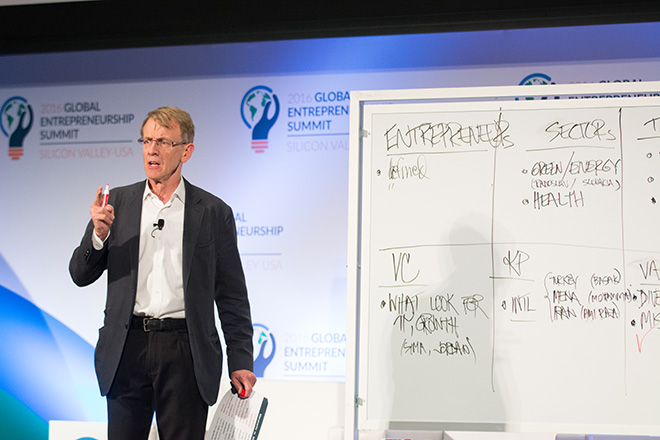The Global Entrepreneurship Summit 2016, which kicked off today at Stanford, is geared to give youth and women a leg up in the entrepreneurial scene. Half of the elite entrepreneurs present were women, while the youngest participant was an 11-year-old.
Those numbers contrasted starkly with other demographic measurements of the business world, such as the mere 37 percent of U.S. businesses founded by women in 2014. However, U.S. Under Secretary of State Richard Stengel pointed out during his opening remarks that the Summit’s makeup is a realistic representation of the world population, which is half women and 44 percent youth — which for Stengel means those under 35.
“People always say, ‘youth are the future,’ and they’re wrong — youth are the present, and that’s why you’re here today,” Stengel said.
The Summit’s twin goals of bringing women entrepreneurs to boardrooms and building businesses in developing countries highlighted the event’s strong emphasis on social responsibility. Organized around a series of talks and panels by leading entrepreneurs, the summit also brings investors and entrepreneurs together to give promising social good startups a boost.
Opening speaker Rahama Wright began her startup journey in her early 20s with a mere $6,000 to her name. Founded in 2005, her company, Shea Yeleen, helps women to run their own shea butter-making cooperatives in West Africa. Since then, the company has expanded to Burkina Faso and Mali.
“We’re showing that women can increase their income to five times the minimum wage in the country, in northern Ghana,” Wright said. “Having that income helps women have access to healthcare services, send their children to school, access land ownership and do things they haven’t been able to do before.”
U.S. Secretary of State John Kerry pointed out that economic development and opportunity is spurred by energetic small- and medium-sized enterprises from people like those present at the summit.
“Most jobs don’t come from the Fortune 500 companies,” Kerry said. “Jobs come from someone who has an idea, who works out of a basement to build something from one person, two people [and then] three.”
In line with Kerry’s remarks, opening session panelist Leila Janah criticized the traditional mentality that the private sector must maximize profit to the exclusion of a more public-spirited mission.
“[We’re used to thinking] that the free hand of the market will solve all problems and it hasn’t,” Janah explained. “We can’t rely on underfunded NGOs to do all of the really important work in the world — to fix massive social problems single-handedly.”
Janah has made headlines and magazine covers as the founder and CEO of two companies, Sama and Laxmi, that link the world’s poorest people with steady jobs.
Janah said that her first company, Sama, has managed to break even this year despite its nonprofit status; for Janah, this is remarkable evidence of the potential of sustainable private sector solutions to solve global problems.
“When the organization isn’t reliant entirely on charity or donations but on the revenue line as well, there are such huge opportunities in the middle ground,” she said.
Contact Fangzhou Liu at fzliu96 ‘at’ stanford.edu.
Photo Gallery: Day One of GES 2016
[justified_image_grid row_height=300 orderby=rand max_rows=6 disable_cropping=yes rss_url=http://stanforddaily.photoshelter.com/gallery/Opening-Wednesday/G0000s9TZ.SSN9iY/C0000K8.wYeh6gqk?feed=rss]
